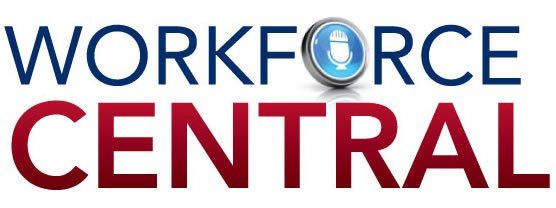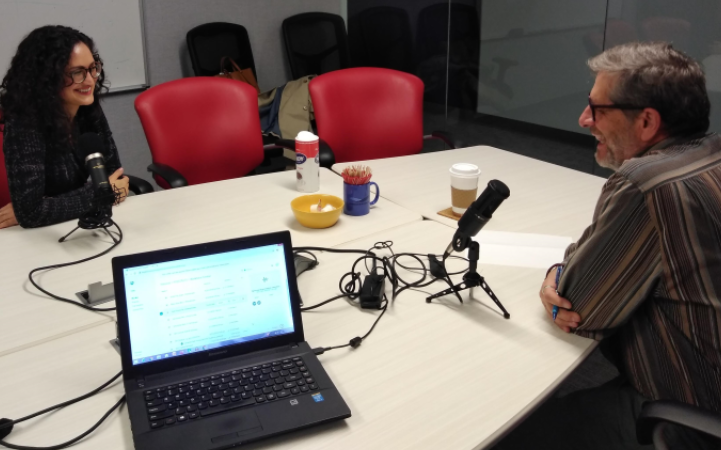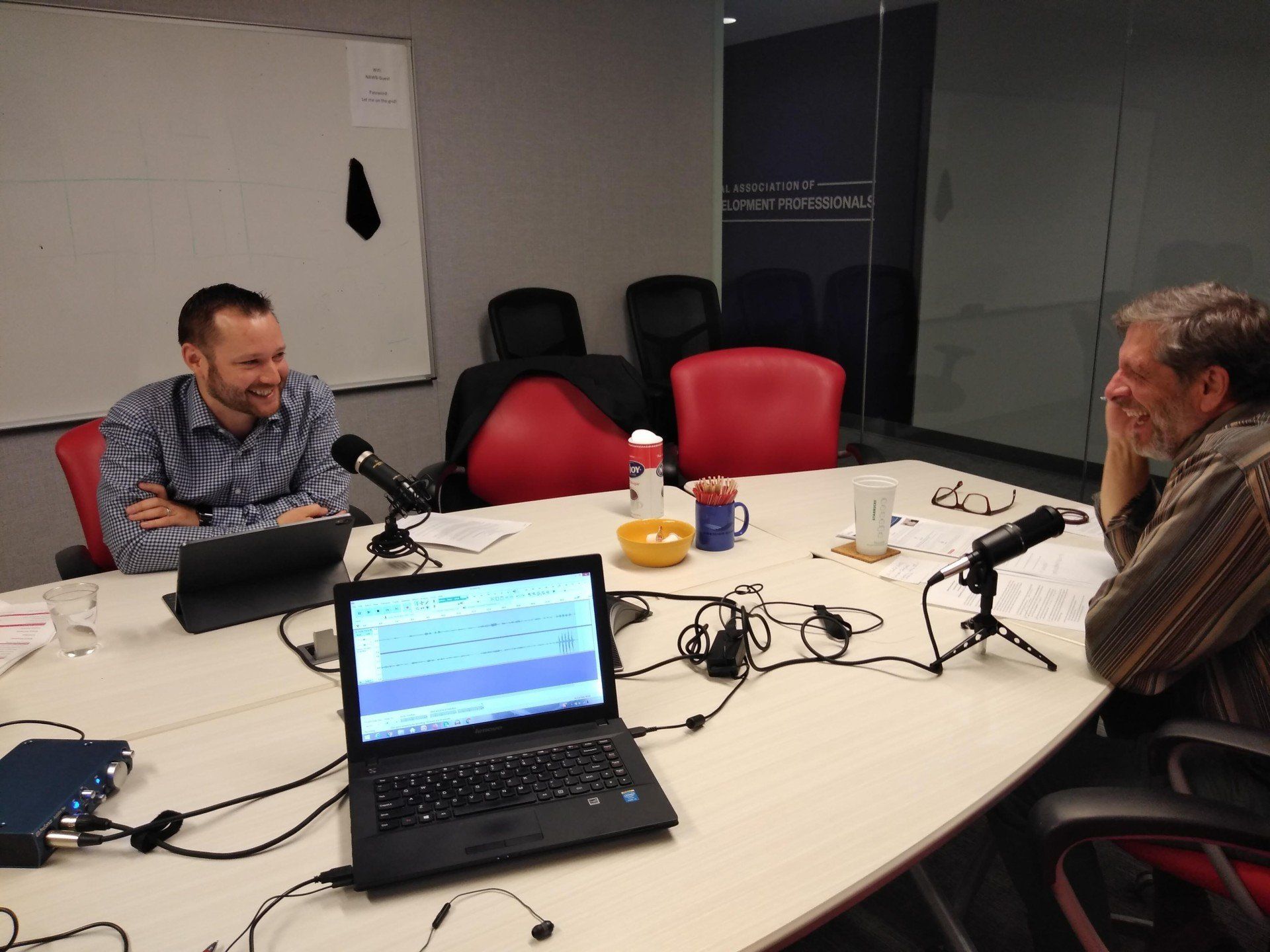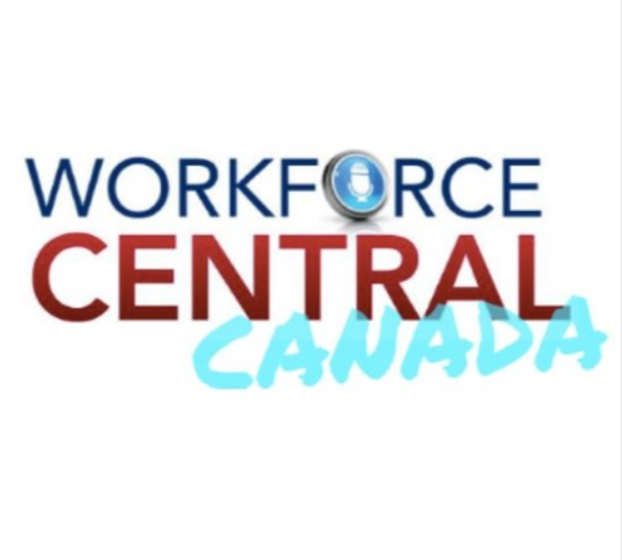WORKFORCE CENTRAL PODCAST
Be a Guest on Workforce Central!
Have best practices or innovative new strategies in workforce development? Share it with the workforce community by being a guest on Workforce Central! Apply here!
**The views expressed on Workforce Central are representative of our guests and not necessarily of NAWB**
Join Brad Turner-Little, President and CEO of the National Association of Workforce Boards, as he interviews local leaders in workforce development, education, business and economic development on key workforce issues and investment strategies to help America compete globally.
On-Demand Episodes: Listen Now!
Episode 8: Partners in Progress: Workforce, Economic Development, and Commerce Unite
In this episode, NAWB President and CEO,
Brad Turner-Little, is joined by
Sheree Anne Kelly, President and CEO of the
Association of Chamber of Commerce Executives (ACCE) and
Nathan Ohle, CEO of the
International Economic Development Council
(IEDC), for a discussion about the intersection of workforce development, economic development, and Chamber of Commerce activities.
The conversation covers how organizations work together on challenges like talent shortages, rural-urban differences, and changes in workforce skills. The leaders share stories of partnerships, discuss their workforce development certificate program, and examine approaches to talent acquisition, including skills-based hiring and work-based learning.
Episode 7: National Apprenticeship Week Spotlight: Apprenticeships in Wisconsin
Tune in as NAWB President and CEO, Brad Turner-Little, is joined by David Polk, Director of the Wisconsin Department of Workforce Development's Bureau of Apprenticeship Standards, and President of NASTAD (National Association of State and Territorial Apprenticeship Directors), during National Apprenticeship Week 2024.
Polk shares his unique perspective as a third-generation plumber who came full circle, from proudly graduating Wisconsin's apprenticeship program to now overseeing it. The conversation explores Wisconsin's innovative approaches to apprenticeship, including its nationally recognized youth apprenticeship program, expansion into new sectors like healthcare and education, and strategies to support small businesses and increase program completion rates. Discover how Wisconsin partners with workforce boards and technical colleges to create successful apprenticeship pathways, and gain insights into the future of work-based learning as a solution to America's growing skilled workforce shortage.
Episode 6: Workforce Solutions from the Border: El Paso's Workforce Innovation Playbook
In this episode, NAWB President and CEO, Brad Turner-Little, is joined by Leila Melendez, CEO of Workforce Solutions Borderplex, in El Paso, Texas. Leila shares her organization's innovative approach to adapting national workforce mandates to meet local needs in the diverse Borderplex region.
She discusses creative initiatives like NextForce, HerForce, and CareForce, which are designed to engage different workforce segments more effectively. Leila also highlights the importance of strong community partnerships in providing accessible and comprehensive services, including their successful program for transitioning military personnel.
Episode 5:Entrepreneurial Approaches for Workforce Boards: Strategies from South Central PA Works
In this episode, CEO of
South Central PA Works,
Jesse McCree, joins us for an illuminating discussion on workforce development innovation. Leading an influential board that spans eight counties in central PA, Jesse offers insights from his nearly eight-year tenure.
The conversation delves into South Central PA Works' pioneering strategies, including fair chance hiring initiatives and community access points. Jesse also recounts his path into the workforce development field and outlines how his organization is harnessing data, fostering agility, and embracing technology to address future labor market challenges.
Episode 4: Workforce Solutions for the Future: Technology, Partnerships, and Community Impact
In this episode, NAWB President and CEO,
Brad Turner-Little, is joined by President and CEO of
CareerSource Central Florida,
Pam Nabors. Pam shares insights on leading a large workforce board and preparing for the future of workforce development and discusses her organization's role in serving a diverse five-county region surrounding Orlando, including efforts to inspire career journeys for youth and to support emerging industries like semiconductors.
Learn about CareerSource Central Florida's innovative programs, including High School Career Express, partnerships with businesses and educational institutions, and the need to embrace technology and rethink service delivery models.
Episode 3: Workforce Innovation in Action: Spotlight on WorkSource Montgomery, Inc.
Tune in for another episode of Workforce Central, as NAWB President and CEO, Brad Turner-Little speaks with Anthony Featherstone, the new Executive Director of WorkSource Montgomery, about workforce development initiatives in Montgomery County, Maryland.
They discuss the county's diverse demographics, major industries, and workforce challenges. Anthony also shares details about the Blueprint for Maryland's Future legislation and WorkSource Montgomery's innovative MoCo CAP program, which provides innovative career counseling for 6th-12th graders in partnership with local schools. He also highlights the board's community workforce network and mobile job center aimed at expanding access to workforce services.
Discover the importance of community engagement, listening to feedback, and building relationships to effectively navigate future workforce challenges!
Episode 2: Overcoming Barriers and Defining Workforce Development: Insights from Coconino County
In this episode of Workforce Central, Brad Turner-Little, President and CEO of NAWB, is joined by Billy Francis, Executive Director of the Coconino County Workforce Development Board in Flagstaff, Arizona.
They discuss the unique challenges and opportunities of workforce development in rural Coconino County, which has a large landmass and significant Native American population. Billy shares his experience coming in as a new Executive Director and undertaking a year of discovery to assess the workforce ecosystem, leading to transformative changes such as implementing a virtual referral system and rebranding the board's message. Discover the importance of building relationships with partners like community colleges, overcoming barriers, and championing workforce development in the community.
Episode 1: Adapting to the Future of Work: Insights from Pikes Peak Workforce Center
Welcome back to an all-new edition of Workforce Central!
In this episode, NAWB President and CEO,
Brad Turner-Little, talks with Executive Director and CEO of Pikes Peak Workforce Center,
Traci Marques. They discuss the vital role that workforce boards play in connecting businesses with job seekers and fostering economic vitality in their communities. Traci shares insights on how her organization serves the diverse needs of urban and rural areas, collaborates with economic development entities, supports small businesses, and helps military veterans transition into the civilian workforce. She also touches on exciting developments on the horizon, such as the integration of artificial intelligence to enhance the efficiency and impact of workforce boards.
E129: Meet Brad Turner-Little, CEO of NAWB
Brad Turner-Little is the new CEO & President of NAWB. Learn about Brad's career journey and his vision for the National Association of Workforce Develpoment Board.
E128: Mental Health in the Workplace: How Workforce Boards Can Support Wellness at Work
John R. Blosnich, Assistant Professor and Director of the Center for LGBTQ+ Health Equity at the Suzanne Dworak-Peck School of Social Work at USC, joins the program to discuss the impact of mental health in the workplace. Discover the impact of the pandemic on workers’ mental health and the life disruptions that can lead to suicidal ideation. John also reveals why workforce professionals often come in contact with individuals who may be experiencing a life crisis and how to best support job seekers who may have mental health challenges.
Takeaways from the Episode:
- Remote work left workers isolated during the pandemic
- Events like divorce and job loss can trigger feelings of helplessness
- Workforce professionals need to be attuned to the mental health status of job seekers
- There is an epidemic of loneliness among young people in the U.S.

E127: The Employment Consequences of Robots
Jay Dixon, an economist for Statistics Canada, joins the program to discuss the research that his organization has conducted about robots and the impact of robots on various industries. Jay reveals three major takeaways from the study and the impact of robots on middle-skill jobs. Discover the correlation between robot adoption and worker shortages in different countries.
Takeaways from the Episode:
- Middle-skill jobs have been largely roboticized
- The need for greater precision, rather than worker shortages, was a greater driving force in the adoption of robots
- Firms adopting robots are more likely to increase quality of production rather than decrease costs
- Robots help to decrease downtime between production runs
E126: Google Career Certificates: Providing Job Training in Fast Growing Fields
Ron sits down for a conversation with Janice Fidalgo of Grow with Google to talk about the partnership between GwG and NAWB, which is providing Career Certificate Scholarships to WDBs across the country. Janice offers an overview of the certificates and discusses the tools and resources available to help job seekers make progress through the courses and then secure new jobs and careers.
Takeaways from the Episode:
- Google career certificates are available in fields including IT Support, UX Design, and Digital Marketing and E-Commerce
- The career certificates prepare individuals for high-wage entry-level jobs, and can particularly help offer opportunities to people from underrepresented groups in tech
- Google and NAWB have partnered to provide certificate scholarships to over 50 workforce boards across the country
Learn more about the Google Career Certificate Scholarship Program: https://www.nawb.org/initiatives/google
E125: Quiet Quitting and Workplace Mental Health
Author and consultant Oreste D'Aversa joins the program to discuss the phenomenon of "quiet quitting" and the impact that it has on the workforce. Oreste reveals the definition of quiet quitting and some of the reasons behind it. Discover the importance of communication between employees and employers, and how employers can address quiet quitting if it is occurring in their organization. You'll also hear about the importance of mental wellness in the workplace and learn a meditation exercise that can be done in any location in only a few minutes.
Takeaways from the episode:
- Quiet quitting is a phenomenon where an employee does the bare minimum that is required of them
- The COVID-19 pandemic has exacerbated quiet quitting in the workplace
- There needs to be more focus on mental wellness and well-being at work
- There is an evolution occurring in the workplace regarding the nature of work
E124: The Economy and Youth Labor Force Participation: With Economist Dr. Paul Harrington
Dr. Paul Harrington, Professor, and Director of the Center for Labor Markets and Policy at Drexel University, returns to the program to provide an updated look at the economy and the labor market. Paul discusses the shift of the regional labor markets, the impact of remote work and the changing dynamics of labor relationships. Discover labor participation rates among youth.
Takeaways from the episode:
- Labor relationships have changed and forced wages to grow
- There is declining labor force participation among men
- Youth who get certificates earn more than those who complete some college
- Employers will be forced to allow highly skilled employees to have more geographic mobility
E123: Preparing Justice Involved Individuals for Successful Reentry and Living Wage Employment
Arti Finn, Co-Founder of American Prison Data Systems (APDS), joins the program to discuss the work that her organization does to promote free and ethical education options for incarcerated learners. Discover some of the biggest challenges in the US around preparing people for employment and a successful transition out of incarceration. Arti also reveals why this should be an issue of focus for workforce boards and how to more intentionally engage this population.
Takeaways From the Episode:
- APDS is funded by states and outside sources and is free to incarcerated learners
- The recidivism rate in the U.S. is 80% within 5 years
- Training needs to be customized according to learners' needs
- Prison systems often have difficult tracking data about education and training
E122: Maximizing Impact with the American Rescue Plan
This episode features an interview with Walter Simmons, CEO of Employ Prince George's and Kyle Marinelli, Manager of Government Relations and Policy for NAWB, as they discuss what workforce boards need to know about the American Recovery Plan Act, or ARPA. You’ll hear details about an exciting new Workforce Program Training Guide, created in partnership between NAWB, the Prince George's County Workforce Development Board and Employ Prince George's (EPG) outlining American Rescue Plan Act policies, definitions and procedures. For more information on the ARPA Guide, contact Kyle Marinelli at MarinelliK@NAWB.org
Takeaways from the Episode:
- ARPA provides a 1.9 trillion dollar relief fund to respond to the impacts of the COVID-19 pandemic
- ARPA authorized the creation of The Coronavirus State and Local Fiscal Recovery Funds or (SLFRF) program
- SLFRF funding is able to be spent on activities that are related specifically towards workforce and economic development
- The federal guidance around the use of ARPA funds is quite broad
E121: Meeting Unprecedented Challenges: Ron Painter on the Importance of Workforce Boards
This episode was originally recorded on the WorkforceRx Podcast by Futuro Health, a podcast where Futuro Health CEO Van Ton-Quinlivan interviews future-focused leaders in education, workforce and healthcare to explore new innovations and approaches. Ron Painter joins the program to discuss the vital role that workforce boards play in advancing economic opportunity, and the importance of bringing together key stakeholders including housing, transportation and community-based organizations. Ron reveals how communities are leveraging their networks and why he is optimistic about the unprecedented challenges facing employers and workers.
Takeaways from the Episode:
- Childcare development funding is critical for workforce development
- Workforce boards can best leverage funds when they have freedom and flexibility
- Local workforce boards need to understand their regional situation and where investments are most needed
- No one organization can solve all workforce challenges, collaboration is key
E120: Preparing Diverse Learners to Pursue In-Demand Cloud Roles
Kevin Kelly, Director, AWS Education Programs at Amazon Web Services, joins the program to discuss the importance of cloud computing for the future of work and the work that AWS Education Programs does to help prepare diverse learners to pursue in-demand cloud roles. Kevin reveals details about a recent global digital skills study and the growing need for technical knowledge due to the COVID-19 pandemic.
Takeaways From the Episode:
- Cloud computing offers high-growth career opportunities
- 97 million new roles will open up due to increase digitalization
- 85 percent of workers say they need increased technical skills due to the pandemic
- Amazon has made a commitment to train 29 million people worldwide for free
Empowering Workforce Systems to Achieve Equitable Economic Advance for All
This episode features an interview with Eshwar Eswaran, Director, JFFLabs LEAD (Leading Economic Advancement through Data). Eshwar discusses the work that JFF is doing to find new and innovative ways to lead workforce and education systems to achieve equitable economic advancement for all, through data and data-driven solutions. He also reveals how timely, accurate and reliable data can help workforce boards increase their impact and responsiveness.
Takeaways From the Episode:
- Better data could have made a different in responding to the 2008 financial crisis
- Accurate, reliable data can help workforce boards be more responsive
- Measuring impact requires effort and asking the right questions
- Data-driven solutions can help leaders accelerate their objectives
E118: A Look at the Labor Market: With Economist Dr. Paul Harrington
Dr. Paul Harrington, Professor, and Director of the Center for Labor Markets and Policy at Drexel University, returns to the program to discuss the current state of the labor market. Dr. Harrington shares insights about the impact of the Great Resignation, youth participation in the labor market, as well as his thoughts about immigration and education.
Takeaways from the Episode:
- The size of the American labor force is 2.3 million below what it was in February of 2020
- There is low participation by youth in the job market
- Rising inflation is leading to greater turnover as people seek better opportunities
- A voucher program can give parents greater educational choices for their children
E117: AI, The Great Resignation, and Supporting Transitioning Veterans
Kamal Ahluwalia, president of Eightfold.ai, joins the program to provide an overview of his organization, share his thoughts about the Great Resignation, as well as his work with veterans and the Transition Assistance Program (TAP). Discover the promise of AI and the importance of creating a succession plan for every individual in an organization. Kamal also discusses what organizations need to think about when working with transitioning veterans.
Takeaways from the Episode:
- You can’t hire your way out of poor retention
- A company of 10,000 employees needs a hiring pool of 2 to 2.5 million
- Many transitioning veterans will take jobs a level or two below what they were doing in the military
- Employers need to be more aware of what roles can be a good fit for veterans
E116: Driving Results: Making the Most of Federal Relief Funding
Andi Phillips, Founder and Managing Partner, the Community Outcomes Fund at Maycomb Capital, joins the program to discuss her thoughts about how workforce boards and local governments can make the most of record stimulus dollars. Discover how to access flexible funding and how to use outcome-based contracts to align spending with the mandated reporting requirements from Treasury.
Takeaways From the Episode:
- Workforce boards should define the impact they want to have on their community
- Outcome-based contracts disperse payments to service providers as participants reach targeted outcomes
- When contract payments are tied to outcomes, there is a lag between when services are provided and payments are released
- There is a need to change the focus from the amount of money spent to the impact of that spend
E115: Congressman Raja Krishnamoorthi on Investing in U.S Workforce Development and Training
Congressman Raja Krishnamoorthi joins the program to share his thoughts about the importance of investing in skill development for the U.S. labor force. Congressman Krishnamoorthi reveals how being a small business owner has shaped his thoughts about workforce and talent development and the challenges that the U.S. is facing when it comes to skilling and reskilling the workforce. He also reveals the role that immigration needs to play in the U.S. labor market.
Takeaways From the Episode:
- Many businesses are struggling to find skilled talent
- We need a greater focus on career and technical education
- Ideally all high school students would have some skills-based training
- A welcoming immigration policy is essential for driving U.S. innovation New Paragraph
E114: How Coursera is Transforming Lives Through Learning
Coursera CEO Jeff Maggioncalda joins the program to discuss the important role that his company has played during the pandemic, and how online learning can help increase the accessibility of education and decrease inequality. Discover some of the biggest learning and education trends that have occurred over the past year and the changing nature of work. Jeff also shares his thoughts on the Coursera Skills Report, which explores skill trends worldwide, helping leaders in higher education, business and government learn which skills are essential for the future of work.
Takeaways from the Episode:
- A promise of better economic opportunity can be a powerful incentive to learn
- As of April of 2020, 1.6 billion students started learning from home
- Microsoft estimates that there will be 150 million new digital jobs in the next 5 years
- There is a lot of evidence that education creates economic prosperity at a national level
E113: Changing the Playbook: Innovative Approaches for Skilling and Reskilling the U.S. Labor Force
Jason Tyszko, VP of the Center for Education and Workforce at the U.S. Chamber of Commerce Foundation, joins the program to discuss the work of the Foundation, and the urgent need for skilling and reskilling the U.S. Labor Force. Jason reveals his thoughts about the need to reimagine what it looks like for the public sector to engage with the business community and discusses the Talent Finance initiative, which explores private sector-led solutions and innovations in finance to better invest in people.
Takeaways from the Episode:
- Businesses have a direct stake in growing and sourcing talent
- There is a growing urgency to source talent in a more equitable manner
- The traditional education pathway is typically not very affordable
- Companies collectively invest about 200 billion dollars a year in training and tuition reimbursement
E112: Recruiting and Hiring for Remote and Flexible Jobs
Widely acclaimed workplace expert, speaker, strategist and innovator Mika Cross joins the program to discuss FlexJobs, a leader in the remote and flexible employment space for employers and job seekers. Discover what employers need to think about when onboarding remote workers, as well as how to attract a newer and wider segment of talent. Mika also reveals how the COVID-19 pandemic has shifted how employees think about work-life balance.
Takeaways From the Episode:
- FlexJobs has more than 51 different job categories, in all levels of employment
- Employers are shifting their focus away from looking at degrees to assessing a candidates chances of succeeding in a remote work environment
- Employers can use position descriptions to reach a wider talent pool
- “Career privilege” refers to jobs that are easily amenable to remote and flexible work
E111: The Unspoken Rules- with Gorick Ng
Gorick Ng, first-gen college student, Harvard grad, management consultant and author of The Unspoken Rules, joins the program to discuss the rules that employees aren’t taught in school, including how to navigate a new role, take ownership, manage expectations, or handle workplace politics.
Discover what top performers do and don’t realize, and how these “unspoken rules” get passed down over the dinner table, or from mentee to mentor, creating an unlevel playing field, with the insiders getting ahead and the outsiders stumbling along through trial and error. Discover wisdom distilled from over 500 interviews with professionals across industries and job types about the biggest mistakes people make at work.
To learn more about Gorick visit http://gorick.com/ and to get a copy of The Unspoken Rules: Secrets to Starting Your Career Off Right visit https://www.amazon.com/gp/product/1647820448/ or https://bookshop.org/books/the-unspoken-rules-secrets-to-starting-your-career-off-right/9781647820442
Takeaways from the Episode:
- Interviewees need to convince employers of their competence, commitment and compatibility
- The 3 “C’s” are unpacked into 20 unspoken rules
- Managers need to be aware of their increasingly diverse employee base
- Representation in a variety of fields is critical for engaging diverse talent
E110: Ensuring Access to Quality Postsecondary Education
Martha Kanter, CEO of College Promise and former Under Secretary of Education, and Jane Oates, President of Working Nation, and former Assistant Secretary for the Employment and Training Administration, join the program to discuss the changes that they have seen regarding education and workforce. Martha and Jane share their thoughts about the impact of the COVID-19 pandemic and remote learning on education, and the efforts that are underway to make work-based learning readily available to students. Discover the changes that need to happen to make a college education more accessible for all students.
Takeaways From the Episode:
- The pandemic has enabled people to leverage technology tools
- Stackable credentials are important for lifelong learning
- We need to move beyond looking at students with a deficit mentality
- It is important to look at the broader supports that students need to do their best work New Paragraph
E109: Career Navigation Technology- Trends, Challenges and Opportunities
Clare Bertrand, Director at JFFLabs. joins the program to discuss the importance of career navigation technology in 2021 and beyond. Clare shares her thoughts about how career development technology fits into virtual service design, and what workforce boards should think about when investigating different tech tools. Discover where investments are being made and a gap in the market when it comes to serving underrepresented communities.
Takeaways From the Episode:
- Career navigation should be thought of as a lifelong process
- Career navigation tools can be used for engagement
- Workforce boards need to assess how career navigation tech can help meet strategic goals
- It can be helpful to do a needs assessment with staff
E108: The 100 Questions Initiative: Ensuring a Future that Benefits Everyone
In this episode, you’ll learn about the 100 Questions Initiative, which seeks to map the world’s 100 most pressing high impact questions that could be answered if relevant data sets were leveraged in a responsible manner. Discover why the future of work is a critical focus for the 100 Questions Initiative, and how to create a common understanding of current and future workforce challenges. Through the 100 Questions Initiative, The GovLab and The Bertelsmann Foundation map out which future of work questions can be answered if datasets and data science are unlocked and used in a responsible manner. Until March 8, you can vote on which questions to prioritize: https://future-of-work.the100questions.org/
Takeaways from the Episode:
- The future of work is a key domain of the 100 Questions Initiative
- We need to think about how to build a new social contract with workers
- There is a need for policymakers to move from insight to action
- The 100 Questions Initiative can help to move from crisis response to long-term planning
E107: COVID-19 Compliance Requirements- What Employers Need to Know
Susan Gross Sholinsky, a labor and employment attorney at Epstein Becker & Green, P.C. and Vice Chair of the firm’s National Employment, Labor & Workforce Management Steering Committee, joins the program to discuss COVID-19 compliance requirements for employers. Discover resources to stay informed about changing laws and what employers need to think about when it comes to liability. You’ll also hear about whether employers can require a mandatory vaccine policy and the approach that the new administration may take when it comes to the regulatory landscape.
NOTE: The information presented in this episode is not intended and should not be taken as legal advice on any particular set of facts or circumstances. The content reflects the personal views and opinions of both Epstein Becker & Green, P.C. and NAWB.
E106: Foresight Thinking, Emerging Trends, and the Pandemic
Richard Lum, CEO of Vision Foresight Strategy, LLC, returns to the program to discuss why a global pandemic is something that could be anticipated, but not necessarily predicted, and what it takes to do quality foresight and strategy work. Discover the key building blocks to foresight work, the industries that are most likely to continue to be impacting by the pandemic, and why workforce boards are well positioned for the future
Takeaways from the Episode:
- The COVID-19 pandemic has been a reminder of how interdependent our world has become
- Despite the vaccines, organizations will likely be dealing with the pandemic through much of 2021
- A lot of foresight work consists of asking “what if” questions
- Emerging issues can sometimes bend or break existing trends
E105: Supporting Job Seeker Performance and Growth
Michael Simpson, CEO of PAIRIN, joins the program to discuss the work that his company is doing to make everyone’s journey personally relevant and equitable. Discover how PAIRIN’s science-based technology and personalized approach to client services ensures not only the success of clients’ programs, but also the success of people in their communities who benefit most from skills-based development and career services. Michael also shares his thoughts about a recent report that PAIRIN released about the 8 foundational building blocks for individual performance and growth.
- Helping job seekers identify their emotions is crucial for success
- It is important to provide realistic feedback to learners in a kind manner
- Optimism and self-confidence are key factors to be a successful entrepreneur
- Job seekers need to develop transferable skills in addition to job specific skills
E104: Grow with Google: Helping Jobseekers Kickstart Their Careers in High-Demand Fields
Christian Michael, Program Manager for Grow with Google, joins the program to discuss the work that Google is doing to create opportunities for nontraditional talent to kickstart their careers in high demand fields, including IT. Christian reveals why Google created their own career certificates and shares why Google is looking to partner with local workforce boards across the United States.
Takeaways from the Episode:
- Two thirds of all jobs created since 2010 require high or medium digital skills
- The majority of U.S. IT support jobs do not require a 4-year degree
- The Google IT Support Professional Certificate is the #1 career certificate on Coursera
- Google is partnering with workforce boards to help onboard local employers to a free Google hiring consortium
Mark Douglass, President of Equus Workforce Solutions, joins the program to discuss the impact of the COVID-19 pandemic on the economy and labor needs. Discover some of the skills that will be increasingly important in the new workplace, and what employers are looking for when evaluating talent. Mark also shares his thoughts on why the workforce system is uniquely qualified to assist with upskilling and reskilling the labor force of today and the future.
Takeaways from the Episode:
- Workforce services have largely moved online since the COVID-19 pandemic
- Employees will increasingly need tech skills in this new environment
- There has been an increased focus on diversity and inclusion in the workplace
- The workforce system is already set up to provide necessary upskilling and reskilling
Eric Seleznow, Senior Advisor at JFF and Former Deputy Assistant Secretary for the US Department of Labor, joins the program to discuss trends in apprenticeships, as well as the impact of the COVID-19 pandemic on apprenticeship programs. Discover the various benefits of apprenticeships for employers and job seekers, and the need for strategic partnerships.
Takeaways From the Episode:
- The US has invested almost a billion dollars into apprenticeship programs
- The COVID-19 pandemic has caused a slowdown in apprenticeships
- Employers are increasingly looking at using apprenticeships to fill talent needs
- Apprenticeships can be a great way to increase diversity in the workforce
E101: Elevating America's Workforce- With Congresswoman Elise Stefanik
Congresswoman Elise Stefanik from New York's 21st District in the House of Representatives, joins the program to discuss her advocacy for Fort Drum and the challenges that the COVID-19 pandemic has created at the U.S.- Canadian border. She also discusses Elevating America’s Workforce Act, legislation that establishes personal reemployment accounts (PRAs) to help displaced workers obtain the training and skills necessary for sustained employment.
Takeaways From The Episode:
- Personal training accounts allow for more flexibility
- There is a focus on getting workers to return safely to work
- There needs to be greater flexibility around reopening the U.S.-Canadian border
- A significant number of Americans may be facing permanent job loss and need reskilling
E100: Driving From the Backseat- How Leaders Can Survive and Succeed
Ronnie Bryant, Founder of Ronnie L. Bryant, LLC and former CEO of the Charlotte Regional Partnership, joins the program to share tips for how leaders can survive and succeed in tumultuous times. Discover the first questions that leaders need to ask, the characteristics of effective leaders, and the metrics by which leaders are measured.
Takeaways From the Episode:
- Leaders need to examine who they are and why they are leading
- Leadership is not a job, it's a lifestyle
- A CEO needs to manage people, not just programs
- Vision is important, but execution is key for leaders
E99: Creating a Culture of Care- Improving Equitable and Inclusive Outcomes
Dr. Paul David Spradley, CEO of Care Based Leadership, LLC, joins the program to discuss the work that his company does collaboratively designing specific solutions around improving organizational climate and equitable and inclusive outcomes. Discover the power of mentoring, how to engage young African-American men, and how to create a culture of care.
Takeaways From the Episode:
- We need to be willing to call out unacceptable behaviors in the workplace
- Listening is a crucial part of mentorship
- People want to bring their real self to work
- Creating a culture of care is a journey, not only a destination
Dr. Paul Harrington, Professor and Director of the Center for Labor Markets and Policy at Drexel University, joins the program to discuss the impact of the economic downturn caused by the COVID-19 pandemic on young people and the emerging workforce. Dr. Harrington also shares his thoughts on the impact that the current disruption may have on the education system, and the decisions that students make regarding pursuing college and careers.
Takeaways From the Episode:
- There was a lot of variation in lockdown policies between states
- Employment among teens and young people has collapsed
- Students may opt to take a gap year due to concerns about COVID-19
- If colleges primarily deliver virtual classes in the fall, students may choose to enter the workforce
In this episode, you'll learn about Operation Next, and the work that they are doing preparing military personnel careers in advanced manufacturing. Launched as a pilot at Fort Campbell, Kentucky in early 2018, Operation Next is an innovative, manufacturing-focused training and credentialing initiative. Operation Next provides a blended learning program to soldiers within their last six months of service, but while still on active duty, resulting in the individual earning one or more nationally portable, standards-based, industry recognized credentials.
Takeaways From the Episode:
- Participants can get involved while they are still on active duty
- Advanced manufacturing is an in-demand career
- The workforce system needs to have a regional focus
- Operation Next is a great opportunity for transitioning service members to obtain in-demand skills
If you’re interested in a discussion with Mark and the CompTIA Custom Training team, you can contact him at mplunkett@comptia.org.
Takeaways From the Episode:
• European countries are having a smoother transition to the new economy
• Managing large data will be an in-demand skill
• Understanding the global supply chain is critical
• We need to be able to see both local and global trends
National Association of Workforce Boards | All Rights Reserved |
Created by Olive + Ash.
Managed by Olive Street Design.






